Heart-Shaped Box with Bonus Material Read online
Page 6
No one was in the hallway.
He shut his eyes. He shut the door. He put his forehead against it, pulled a deep breath down into his lungs and held it, let it go slowly. His face was clammy with sweat, and he lifted a hand to wipe it away. Something icy and sharp and hard lightly grazed his cheek, and he opened his eyes and saw the dead man’s curved razor in his hand, the blue-steel blade reflecting an image of his own wide, staring eyeball.
Jude shouted and flung it down, then looked at the floor, but already it wasn’t there.
11
He backed away from the door. The room was filled with the sound of strained breathing, his own and Marybeth’s. In that moment she was Marybeth. He couldn’t recall what it was he usually called her.
“What kind of shit are you on?” she asked, in a voice that hinted at a hillbilly drawl, faint but distinctly southern.
“Georgia,” he said, remembering then. “Nothing. I couldn’t be more sober.”
“Oh, the hell. What are you taking?” And that subtle, barely-there drawl was gone, receding as quickly as it had come. Georgia had lived a couple years in New York City, where she’d made a studied effort to lose her accent, didn’t like being taken for a cornpone hick.
“I got off all my shit years ago. I told you.”
“What was that in the hall? You saw something. What’d you see?”
He glared a warning at her, which she ignored. She stood huddled before him in her pajamas, her arms crossed under her breasts, hands tucked out of sight against her sides. Her feet were spread slightly apart, as if, should he try to move past her into the rest of the bedroom, she would block his way—an absurd prospect for a girl a hundred pounds lighter than he was.
“There was an old man sitting out in the hall. In the chair,” he said at last. He had to tell her something and didn’t see any reason to lie. Her opinion of his sanity didn’t trouble him. “We walked right by him, but you didn’t see him. I don’t know if you can see him.”
“That’s lunatic bullshit.” She said it with no special conviction.
He started toward the bed, and she got out of his way, pressed herself to the wall.
The dead man’s suit was spread neatly across his side of the mattress. The deep, heart-shaped box lay on the floor, the black lid resting next to it, white tissue paper hanging out. He caught a whiff of the suit when he was still four paces away from it and flinched. It hadn’t smelled that way when it first came out of the box, he would’ve noticed. Now it was impossible not to notice it. It had the ripe odor of corruption, something dead and spoiling.
“Christ,” Jude said.
Georgia stood at a distance, a hand cupped over her mouth and nose. “I know. I was wondering if there was something in one of the pockets. Something going bad. Old food.”
Breathing through his mouth, Jude patted down the jacket. He thought it very likely he was about to discover something in an advanced state of decomposition. It would not have surprised him to find that Jessica McDermott Price had stuffed a dead rat into the suit, a little something extra to go with his purchase, at no additional charge. Instead, though, he felt only a stiff square of what was maybe plastic in one pocket. He slipped it out for a look.
It was a photograph, one he knew well, Anna’s favorite picture of them. She had taken it with her when she left. Danny snapped it one afternoon in late August, the sunlight reddish and warm on the front porch, the day swarming with dragonflies and glittering motes of dust. Jude perched on the steps in a worn denim jacket, his Dobro over one knee. Anna sat beside him, watching him play, her hands squeezed between her thighs. The dogs were sprawled in the dirt at their feet, staring quizzically up at the camera.
It had been a good afternoon, maybe one of the last good afternoons before things started to go bad, but looking at the photograph now brought him no pleasure. Someone had taken a Sharpie to it. Jude’s eyes had been marked out in black ink, covered over by a furious hand.
Georgia was saying something from where she stood a few feet away, her voice shy, uncertain. “What did he look like? The ghost in the hall?”
Jude’s body was turned so she couldn’t see the photograph, a lucky thing. He didn’t want her to see it.
He struggled to find his voice. It was hard to get past the unhappy shock of those black scribbles blotting out his eyes in the picture. “An old man,” he managed at last. “He was wearing this suit.”
And there were these awful fucking black scribbles floating in front of his eyes and they looked just like this, Jude imagined telling her, turning to show her the snapshot at the same time. He didn’t do it, though.
“He just sat there?” Georgia asked. “Nothing else happened?”
“He stood up and showed me a razor on a chain. A funny little razor.”
On the day Danny took the picture, Anna was still herself, and Jude thought she’d been happy. Jude had spent most of that late-summer afternoon beneath the Mustang, and Anna had stayed close by, crawling under herself to pass him tools and necessary parts. In the photo there was a smear of motor oil on her chin, dirt on her hands and knees—an appealing, well-earned grime, the kind of filth you could take pride in. Her eyebrows were bunched up, a pretty dimple between them, and her mouth was open, as if she were laughing—or, more likely, about to ask him a question. You go fishin’ much on Lake Pontchartrain? What’s the best dog you ever owned? Her with her questions.
Anna had not asked him why he was sending her away, however, when it was over. Not after the night he found her wandering the side of the highway in a T-shirt and nothing else, people honking at her as they went past. He hauled her into the car and pulled back his fist to hit her, then slugged the steering wheel instead, punching it until his knuckles bled. He said enough was enough, that he was going to pack her shit for her, send her on her way. Anna said she’d die without him. He said he’d send flowers to the funeral.
So: She at least had kept her word. It was too late to keep his.
“Are you messing with me, Jude?” Georgia asked. Her voice was close. She was creeping toward him, in spite of her aversion to the smell. He slid the picture back into the pocket of the dead man’s suit before she could see. “Because if this is a joke, it sucks.”
“It isn’t a joke. I guess it’s possible I’m losing my mind, but I don’t think that’s it either. The person who sold me the…suit…knew what she was doing. Her little sister was a fan who committed suicide. This woman blames me for her death. I talked to her on the phone just an hour ago, and she told me so herself. That’s one part of this thing I’m sure I didn’t imagine. Danny was there. He heard me talking to her. She wants to get even with me. So she sent me a ghost. I saw him just now in the hall. And I saw him last night, too.”
He began to fold the suit, intending to return it to its box.
“Burn it,” Georgia said, with a sudden vehemence that surprised him. “Take the fucking suit and burn it.”
Jude felt, for an instant, an almost overpowering impulse to do just that, find some lighter fluid, douse it, cook it in the driveway. It was an impulse he immediately mistrusted. He was wary of any irrevocable action. Who knew what bridges might be burned along with it? He felt the slightest flicker of an idea, something about the awful-smelling suit and how it might be of use, but the thought drifted away before he could fix on it. He was tired. It was hard to pin a solid thought in place.
His reasons for wanting to hold on to the suit were illogical, superstitious, unclear even to himself, but when he spoke, he had a perfectly reasonable explanation for keeping it. “We can’t burn it. It’s evidence. My lawyer is going to want it later, if we decide to build a case against her.”
Georgia laughed, weakly, unhappily. “What? Assault with a deadly spirit?”
“No. Harassment, maybe. Stalking. It’s a death threat anyway, even if it’s a crazy one. There’s laws on that.”
He finished folding the suit and set it back in its nest of tissue paper, inside the box. He b
reathed through his mouth as he did it, head turned from the stink.
“The whole room smells. I know this is pussy, but I feel like I might yak,” she said.
He slipped a sideways look at her. She was absentmindedly clutching her right hand to her chest, staring blankly at the glossy black heart-shaped box. She had, until just a few moments before, been hiding the hand against her side. The thumb was swollen, and the place where the pin had gone in was now a white sore, the size of a pencil eraser, glistening with pus. She saw him looking at it, glanced down at herself, then up again, smiling miserably.
“You got a hell of an infection there.”
“I know. I been putting Bactine on it.”
“Maybe you ought to see someone about it. If it’s tetanus, Bactine won’t take care of it.”
She closed her fingers around the injured thumb, squeezed it gently. “I pricked it on that pin hidden in the suit. What if it was poisoned?”
“I guess if it had cyanide on it, we’d know by now.”
“Anthrax.”
“I spoke to the woman. She’s country-fried stupid, not to mention in need of some superior fucking psychiatric drugs, but I don’t think she would’ve sent me anything with poison on it. She knows she’d go to jail for that.” He touched Georgia’s wrist, pulled her hand toward him, and studied the thumb. The skin around the area of infection was soft and rotten and pruned up, as if it had been soaking in water for a long time. “Why don’t you go and set in front of the TV. I’ll have Danny book an appointment with the doctor.”
He let go of her wrist and nodded toward the door, but she didn’t move.
“Will you look and see if he’s in the hall?” she asked.
He stared for a moment, then nodded and went to the door. He opened it half a foot and peeked out. The sun had shifted or moved behind a cloud, and the hallway was in cool shadow. No one sat in the Shaker chair against the wall. No one stood in the corner with a razor on a chain.
“All clear.”
She touched his shoulder with her good hand. “I saw a ghost once. When I was a kid.”
He wasn’t surprised. He hadn’t met a Goth girl yet who hadn’t had some kind of brush with the supernatural, who didn’t believe, with utter, embarrassing sincerity, in astral forms or angels or Wiccan spellcraft.
“I was living with Bammy. My grandmother. This was just after the first time my daddy threw me out. One afternoon I went in the kitchen to pour myself a glass of her lemonade—she makes real nice lemonade—and I looked out the back window, and there was this girl in the yard. She was picking dandelions and blowing on them to make them fly apart, you know, like kids do, and she was singing to herself while she was doing it. This girl a few years younger than myself, in a real cheap dress. I pushed up the window to yell out to her, find out what she was doing in our yard. When she heard the window squeak, she looked up at me, and that’s when I knew she was dead. She had these messed-up eyes.”
“How do you mean messed-up?” Jude asked. The skin on his forearms prickled and tightened, going rough with gooseflesh.
“They were black eyes. No, they weren’t even like eyes at all. It was more like…like they were covered over.”
“Covered over,” Jude repeated.
“Yes. Marked out. Black. Then she turned her head and seemed to look over at the fence. In another moment she hopped up and walked across the yard. She was moving her mouth, like she was talking to someone, only no one was there, and I couldn’t hear any words coming out of her. I could hear her when she was picking dandelions and singing to herself, but not when she got up and seemed to be talking to someone. I always thought that was a strange thing—how I could only hear her when she sang. And then she reached up, like there was an invisible person standing in front of her, just on the other side of Bammy’s fence, and she was taking his hand.
“And I got scared all of a sudden, like got chills, because I felt something bad was going to happen to her. I wanted to tell her to let go of his hand. Whoever was taking her hand, I wanted her to get away from him. Only I was too scared. I couldn’t get my breath. And the little girl looked back at me one more time, kind of sad, with her marked-over eyes, and then she came up off the ground—I swear to God—and floated over the fence. Not like she was flying. Like she was being picked up by invisible hands. The way her feet dangled in the air. They bumped into the pickets. She went over, and then she was gone. I got the flop sweats and had to sit down on the kitchen floor.”
Georgia darted a look at Jude’s face, maybe to see if he thought she was being foolish. But he only nodded that she should go on.
“Bammy came in and cried out and said, ‘Girl, what’s the matter?’ But when I told her what I saw, that was when she got really upset and started crying. She sat down on the floor with me and said she believed me. She said I had seen her twin sister, Ruth.
“I knew about Ruth, who died when Bammy was little, but it wasn’t until then that Bammy told me what really happened to her. I always thought she got run over by a car or something, but it wasn’t like that. One day, when they were both about seven or eight—this was 1950-something—their mother called them in for lunch. Bammy went, but Ruthie stayed out, because she didn’t feel like eating and because she was just naturally disobedient. While Bammy and her folks were inside, someone snatched her out of the backyard. She wasn’t ever seen again. Except now and then, people at Bammy’s house spot her blowing on dandelions and singing to herself, and then someone who isn’t there takes her away. My mother saw Ruth’s ghost, and Bammy’s husband seen her once, and some of Bammy’s friends, and Bammy, too.
“Everyone who saw Ruth was just like me. They wanted to tell her not to go, to stay away from whoever was on the other side of the fence. But everyone who sees her is too scared by the sight of her to speak. And Bammy said she thought it wouldn’t ever be over until someone found their voice and spoke up. That it was like Ruth’s ghost was in a kind of dream, stuck repeating her last minutes, and she’ll be that way until someone calls out to her and wakes her up.”
Georgia swallowed, fell silent. She bowed her head, so her dark hair hid her eyes.
“I can’t believe the dead want to hurt us,” she said finally. “Don’t they need our help? Don’t they always need our help? If you see him again, you should try to talk to him. You should find out what he wants.”
Jude didn’t believe that it was a matter of if, only when. And he already knew what the dead man wanted.
“He didn’t come for talk,” Jude said.
12
Jude wasn’t sure what to do next, so he made tea. The simple, automatic gestures of filling the kettle, spooning loose tea into the strainer, and finding a mug had a way of clearing his head and slowing time, opening a useful silence. He stood at the range listening to the kettle tick.
He did not feel panicked, a realization that brought him some satisfaction. He was not ready to run, had doubts there was anything to gain from running anyway. Where could he go that would be better than here? Jessica Price had said the dead man belonged to him now and would follow him wherever he went. Jude flashed to an image of himself sliding into a first-class seat on a flight to California, then turning his head to see the dead man sitting next to him, with those black scribbles floating in front of his eyes. He shuddered, shook off the thought. The house was as good a place as any to make a stand—at least until he figured out some spot that made more sense. Besides, he hated to board the dogs. In the old days, when he went on tour, they always came on the bus with him.
And no matter what he’d said to Georgia, he had even less interest in calling the police or his lawyer. He had an idea that dragging the law into it might be the worst thing he could do. They could bring a case against Jessica McDermott Price, and there just might be some pleasure in that, but getting even with her wouldn’t make the dead man go away. He knew that. He’d seen lots of horror movies.
Besides, calling in the police to rescue him rubbed against h
is natural grain, no small matter. His own identity was his first and single most forceful creation, the machine that had manufactured all his other successes, which had produced everything in his life that was worth having and that he cared about. He would protect that to the end.
Jude could believe in a ghost but not a boogeyman, a pure incarnation of evil. There had to be more to the dead man than black marks over his eyes and a curved razor on a golden chain. He wondered, abruptly, what Anna had cut her wrists with, became conscious all over again of how cold it was in the kitchen, that he was leaning toward the kettle to absorb some of its ambient heat. Jude was suddenly certain she had slashed her wrists with the razor on the end of her father’s pendulum, the one he’d used to mesmerize desperate suckers and to search for well water. He wondered what else there was to know about how Anna had died and about the man who’d been a father to her and who had discovered her body in a cold bath, the water darkened with her blood.
Maybe Danny had turned up Anna’s letters. Jude dreaded reading them again and at the same time knew that he had to. He remembered them well enough to know now that she’d been trying to tell him what she was going to do to herself and he’d missed it. No—it was more terrible than that. He had not wanted to see, had willfully ignored what was right in front of him.
Her first letters from home had conveyed a breezy optimism, and their subtext was that she was getting her life together, making sound, grown-up decisions about her future. They arrived on rich white card stock and were composed in delicate cursive. As with her conversation, these letters were filled with questions, although, in her correspondence at least, she didn’t seem to expect any answers. She would write that she had spent the month sending out job applications, then rhetorically ask if it was a mistake to wear black lipstick and motorcycle boots to an interview at a day-care center. She would describe two colleges and wonder at length about which would be better for her. But it was all a con, and Jude knew it. She never got the job at the day care, never mentioned it again after that one letter. And when the spring semester rolled around, she had moved on to applying for a spot at a beauticians’ academy, college forgotten.

 The Fireman
The Fireman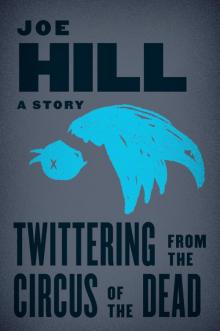 Twittering From the Circus of the Dead
Twittering From the Circus of the Dead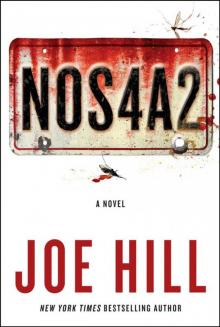 Nos4a2
Nos4a2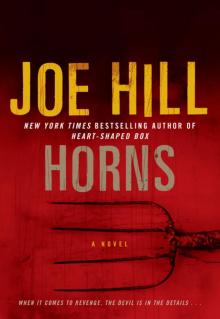 Horns
Horns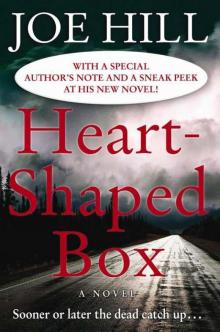 Heart-Shaped Box
Heart-Shaped Box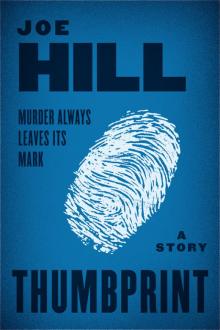 Thumbprint: A Story
Thumbprint: A Story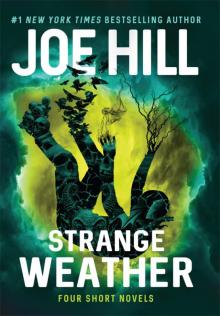 Strange Weather
Strange Weather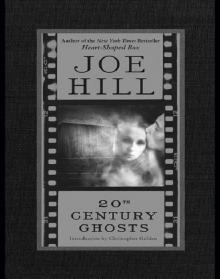 20th Century Ghosts
20th Century Ghosts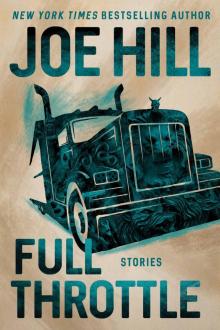 Full Throttle
Full Throttle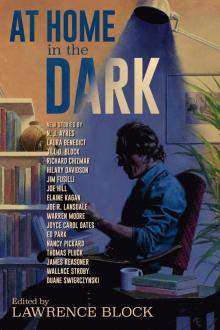 At Home in the Dark
At Home in the Dark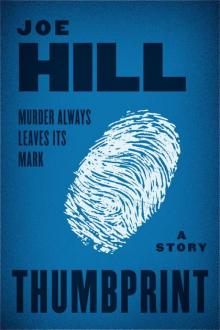 Thumbprint
Thumbprint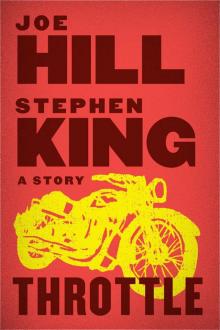 Throttle
Throttle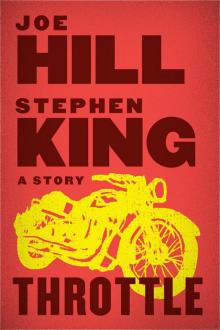 Throttle (Kindle Single)
Throttle (Kindle Single)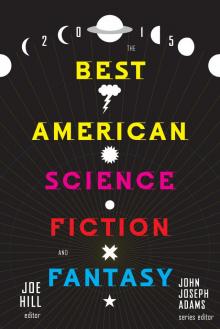 The Best American Science Fiction and Fantasy 2015
The Best American Science Fiction and Fantasy 2015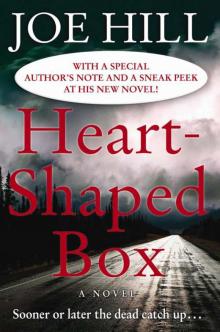 Heart-Shaped Box with Bonus Material
Heart-Shaped Box with Bonus Material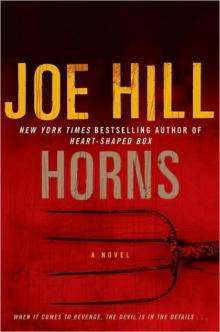 Horns: A Novel
Horns: A Novel